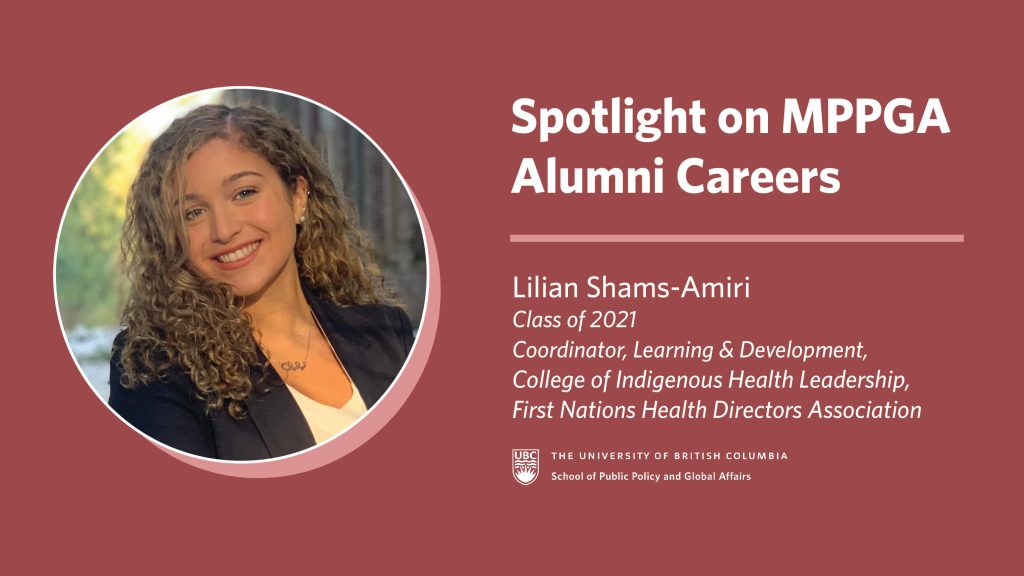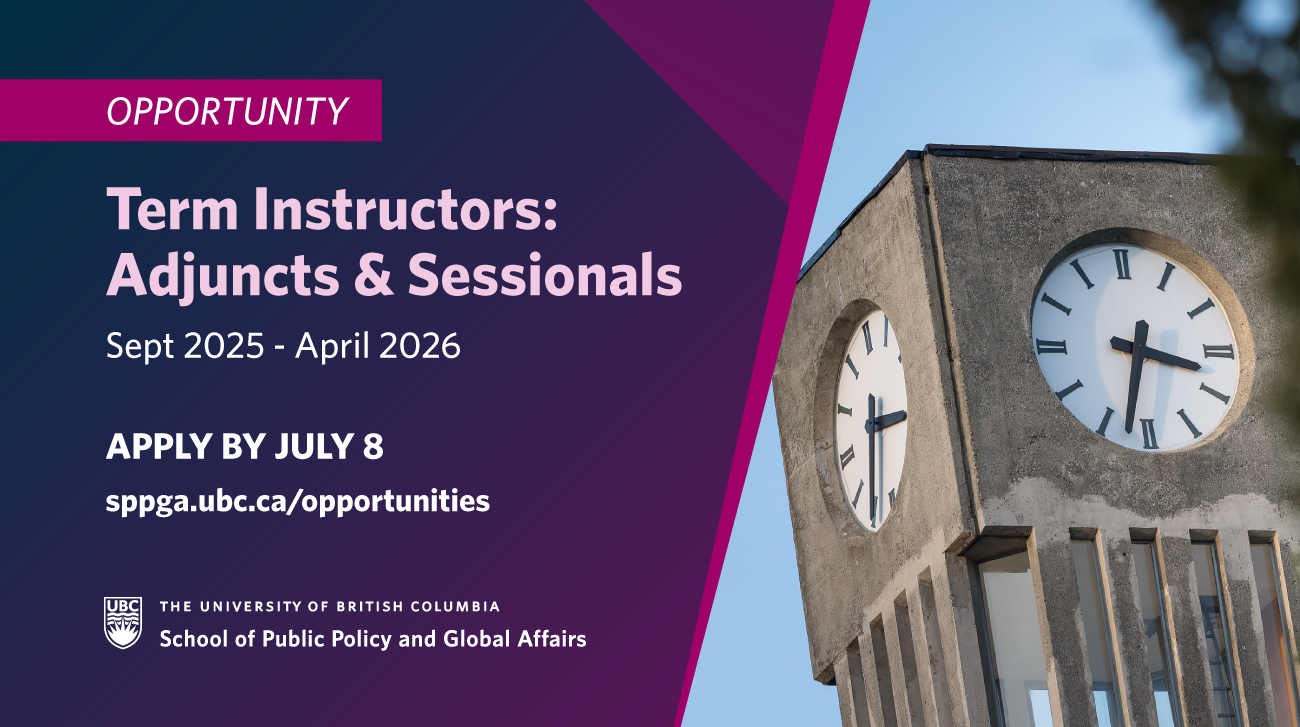

During our Spotlight on MPPGA Alumni Careers series, meet the UBC Master of Public Policy and Global Affairs (MPPGA) alumni who are committed to addressing pressing and complex public policy and global affairs challenges facing communities around the world.
Today, we are featuring Lilian Shams-Amiri (‘21) who currently works as the Coordinator of Learning and Development at the College of Indigenous Health Leadership housed in the First Nations Health Directors Association.
SPPGA: Could you please tell us a little about yourself, your background, and how you became interested in public policy and global affairs?
I was born and raised in Montreal, Quebec to Persian parents who escaped Iran as refugees seeking a better future. Their lifelong passion for justice, freedom, and equality encouraged me to pursue an academic path that would allow me to help and collaborate with other minority groups.
During my undergraduate degree at the University of Toronto completing a Double Major in Criminology and Canadian Studies, I learned more about the injustices and racism facing many minority groups and was able to learn about the historic and contemporary issues facing Indigenous communities in Canada. The knowledge I gained during this time inspired me to pursue the MPPGA program to give me the tools and experience to help make real, actionable change.
SPPGA: Were there experiences you had during the MPPGA program that directly or indirectly contributed to your career journey?
As someone who directly entered my Master’s degree right after completing an undergraduate degree, I was one of the few students who did not have a lot of professional experience but that all changed thanks to the opportunities I was awarded in the MPPGA program.
One of my first opportunities was during my co-op. The end of my first year of the program coincided with the height of the COVID-19 pandemic so I did not expect to get a position but continued to apply and was given a great opportunity by the First Nations Health Authority.
Thanks to my co-op experience, I was selected by Dr. Sheryl Lightfoot to work on her research project by conducting desk research on ways in which Indigenous peoples are involved in immigration, defense policy, foreign and trade policy, and global climate change and trade agreement discussions in the Canadian, New Zealand, and global contexts.
Finally, during the Global Policy Project in my final year of the program, I worked with the Tū’desē’cho Wholistic Indigenous Development Society which is a Tahltan First Nations organization based on Tahltan territory in Northern British Columbia. Unfortunately, due to the pandemic, we were unable to visit the territory but through the interview process, we engaged with the community and met Tahltan Elders, youth, and many other community members.
SPPGA: What was your Co-op position and what were your key takeaways? Did this position change how you think about your skills and career path or interests?
At the height of the pandemic I came back home to Montreal to be closer to my family and completed my second semester of first-year online. Although the prospect of being able to attain a co-op seemed bleak, I applied to the First Nations Health Authority’s opening for a student to work within the Shared Secretariat division and was selected for the role. Throughout the summer and my second year, I was able to improve my communication skills, improve my project management skills, and build meaningful relationships with co-workers and supervisors and learn more about different First Nations communities in B.C. The position solidified my desire to have a career working with First Nations communities.
SPPGA: Please describe your current role. What makes you proud about this work?
Because of my strong work during my co-op term, I was hired for my current role as the Coordinator of Learning and Development at the College of Indigenous Health Leadership housed in the First Nations Health Directors Association.
My duties include providing expert advice and coordination for FNHDA Learning and Development, including resources, planning, management, and on-site/on-line oversight. In addition, I collaborate closely with the Directors of the Shared Secretariat on the implementation of major strategies, including the shared engagement framework in the areas of change management, execution, and evaluation of events and initiatives, functions, services and processes, and partnership development.
I’m proud of my work with First Nations Health Directors because I am able to work directly on the ground and learn from First Nations health directors while building meaningful relationships and learning more about each community’s culture, history as well as how they are working on creating the best health outcomes for their future generations.
SPPGA: What specific knowledge, skills, and/or networks did you gain in the MPPGA program that help you succeed in this role?
The MPPGA program allowed me to gain knowledge surrounding how policies are built and designed, who informs them, and how they work in practice. The program also helped me gain a network of colleagues and professors that help me understand different points of view, attain information, and build connections to others who are able to help inform my work.
SPPGA: What is your career advice for current MPPGA students and new graduates?
The best career advice I ever received is: Don’t limit yourself! There are so many interesting companies and organizations both domestically and internationally that are doing amazing work that may not necessarily be completely policy-focused but may relate to another key interest or passion you may have such as gender, economics, environment, etc.; never say no to an opportunity and be flexible!
Thank you for your time and insights!
Button: Visit Her LinkedIn Profile


